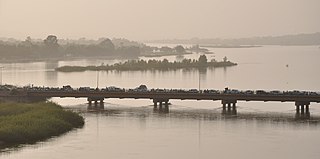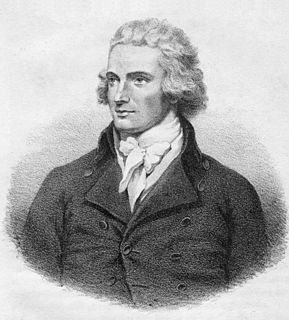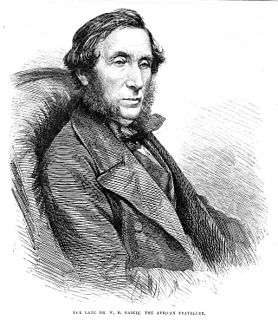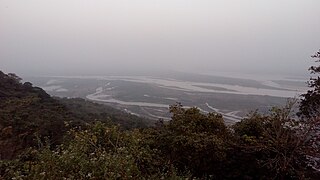
The Niger River is the principal river of West Africa, extending about 4,180 km (2,600 mi). Its drainage basin is 2,117,700 km2 (817,600 sq mi) in area. Its source is in the Guinea Highlands in southeastern Guinea near the Sierra Leone border. It runs in a crescent through Mali, Niger, on the border with Benin and then through Nigeria, discharging through a massive delta, known as the Niger Delta, into the Gulf of Guinea in the Atlantic Ocean. The Niger is the third-longest river in Africa, exceeded only by the Nile and the Congo River. Its main tributary is the Benue River.

Mungo Park was a Scottish explorer of West Africa. After an exploration of the upper Niger River around 1796, he wrote a popular and influential travel book titled Travels in the Interior Districts of Africa in which he theorized the Niger and Congo merged to become the same river. He was killed during a second expedition, having successfully traveled about two-thirds of the way down the Niger. With Park's death, the idea of a Niger-Congo merger remained an open question although it became the leading theory among geographers. The mystery of the Niger's course, which had been speculated about since the Ancient Greeks and was second only to the mystery of the Nile's source, was not solved for another 25 years, in 1830, when it was discovered the Niger and Congo were in fact separate rivers.

Kogi State is one of the 36 States of Nigeria, located in the Nigerian Middle Belt. Created in 1991 from parts of Kwara State and Benue State, Kogi State is noted as being the only state in Nigeria to border ten other states. Kogi State is nicknamed the "Confluence State" due the fact that the confluence of the River Niger and the River Benue occurs in its capital, Lokoja. Due to its strategic position in the middle of the country and its access to these major rivers, Kogi State is a key center of commercial trade in Nigeria.The majority of Kogi State residents are Igala, Ebira and Okun. Agriculture remains dominant in the Kogi State economy.

Sir George Dashwood Taubman Goldie was a Manx administrator who played a major role in the founding of Nigeria. In many ways, his role was similar to that of Cecil Rhodes elsewhere in Africa but he did not seek publicity.

The Royal Niger Company was a mercantile company chartered by the British government in the nineteenth century. It was formed in 1879 as the United African Company and renamed to National African Company in 1881 and to Royal Niger Company in 1886. In 1929 the company became part of the United Africa Company, which came under the control of Unilever in the 1930s and continued to exist as a subsidiary of Unilever until 1987, when it was absorbed into the parent company.

Northern Nigeria was a British protectorate which lasted from 1900 until 1914 and covered the northern part of what is now Nigeria.

Lokoja is a city in Nigeria. It lies at the confluence of the Niger and Benue rivers and is the capital of Kogi State. While the Oworo, Bassa Nge and Nupe are indigenous to the area, other ethnic groups of Nigeria, including the Kupa-Nupe, Hausa, Ebira, Igala, Igbo, Bini/Edo, and Tiv have recently established themselves.

Joseph Thomson was a British geologist and explorer who played an important part in the Scramble for Africa. Thomson's gazelle and Thomson's Falls, Nyahururu are named after him. Excelling as an explorer rather than an exact scientist, he avoided confrontations among his porters or with indigenous peoples, neither killing any native nor losing any of his men to violence. His motto is often quoted to be "He who goes gently, goes safely; he who goes safely, goes far."

Northern Nigeria was an autonomous division within Nigeria, distinctly different from the southern part of the country, with independent customs, foreign relations and security structures. In 1962 it acquired the territory of the British Northern Cameroons, which voted to become a province within Northern Nigeria.

Colonial Nigeria was the era in the history of Nigeria when Nigeria was ruled by the United Kingdom from the mid-nineteenth century until 1960 when Nigeria achieved independence. British influence in the region began with the prohibition of slave trade to British subjects in 1807. Britain annexed Lagos in 1861 and established the Oil River Protectorate in 1884. British influence in the Niger area increased gradually over the 19th century, but Britain did not effectively occupy the area until 1885. Other European powers acknowledged Britain's dominance over the area in the 1885 Berlin Conference.

William Balfour Baikie was a Scottish explorer, naturalist and philologist.

Zungeru is a town in Niger State, Nigeria. It was the capital of the British protectorate of Northern Nigeria from 1902 until 1916. It is the site of the Niger State Polytechnic and is located on the Kaduna River.

This is a survey of the postage stamps and postal history of the Southern Nigeria Protectorate.

Lagos Colony was a British colonial possession centred on the port of Lagos in what is now southern Nigeria. Lagos was annexed on 6 August 1861 under the threat of force by Commander Beddingfield of HMS Prometheus who was accompanied by the Acting British Consul, William McCoskry. Oba Dosunmu of Lagos resisted the cession for 11 days while facing the threat of violence on Lagos and its people, but capitulated and signed the Lagos Treaty of Cession. Lagos was declared a colony on 5 March 1862. By 1872 Lagos was a cosmopolitan trading center with a population over 60,000. In the aftermath of prolonged wars between the mainland Yoruba states, the colony established a protectorate over most of Yorubaland between 1890 and 1897. The protectorate was incorporated into the new Southern Nigeria Protectorate in February 1906, and Lagos became the capital of the Protectorate of Nigeria in January 1914. Since then, Lagos has grown to become the largest city in West Africa, with an estimated metropolitan population of over 9,000,000 as of 2011.
Efik proper; Efik.Usem Efịk) is the native language of the Efik people of Nigeria. It is the official language of Cross River State in Nigeria. The language is named after the Efik people who are situated in the present-day Cross River state and Akwa Ibom state. The Efik language is mutually intelligible with other lower Cross River languages such as Ibibio, Annang, Oro and Ekid but the degree of intelligibility in the case of Oro and Ekid is unidirectional; in other words, speakers of these languages speak and understand Efik but not vice-versa. The Efik vocabulary has been enriched and influenced by external contact with the British, Portuguese and other surrounding communities such as Balondo, Oron, Efut, Okoyong, Efiat and Ekoi (Qua).
The Niger expedition of 1841 was mounted by British missionary and activist groups in 1841-1842, using three British iron steam vessels to travel to Lokoja, at the confluence of the Niger River and Benue River, in what is now Nigeria. The British government backed the effort to make treaties with the native peoples, introduce Christianity and promote increased trade. The crews of the boats suffered a high mortality from disease.
The Colonial history of Northern Nigeria extends from the British pacification campaigns to the independence of Northern Nigeria in 1953.
The history of Northern Nigeria covers the history of the region form pre-historic times to the modern period of Northern Nigerian state.

The Brass River is one of the branches of the Nun River, which in turn is a branch of the Niger River, in the Niger Delta in Nigeria. In the 19th century the river was an important trading route, first for slaves and later for palm oil. Brass River Crude Oil is named for a refinery on the river.

The Mount Patti Hill is a 1503 foot-tall mountain and tourist attraction in Lokoja, Nigeria. It is famous for being the place where British journalist and writer Flora Louise Shaw gave Nigeria its name.
Great Britain, Great Britain. Foreign Office - 1890 - Read - More editions His D. W. Sargent. >4 Chief Ozom. OYAN. mark. Witnesses to the mark of the Chief of Igabo : Isms Palmer. W. Tl G. Munday. S. F. Jonnson. (8-3.)-—Treaty with the Chiefs of O/caba, January 8, 1885. Her Majesty the Queen
Goldie, Sir George Dashwood Taubman (1846- ), English administrator, the founder of Nigeria, was born on the 20th ... Through Joseph Thomson, David Mcintosh, D. W. Sargent, J. Flint, William Wallace, E. Dangerfield and numerous. Reference 3. British and foreign state papers, Volume 87 By Great Britain. Foreign Office
Robert I. Rotberg - 1971 - Snippet view - More editions Three days later, with the spectre of Flegel to spur his movements, Thompson joined Hamilton and D. W. Sargent, the Company's second-in-command on the river, aboard the motor launch Frangais. Together they slowly passed through the narrow, Joseph Thomson and the exploration of Africa - Page 214
These agreements could with luck enable Goldie to exclude his competitors, pari passu, and despite the provisions of freedom of navigation ... In view of the hostility of the Etsu of Nupe, Thomson, Sargent, and McIntosh - whom Thomson met at Lokoja and liked immensely ... purpose the common labourers who worked for the Company at Lokoja and one or two other posts farther north along the Niger.














